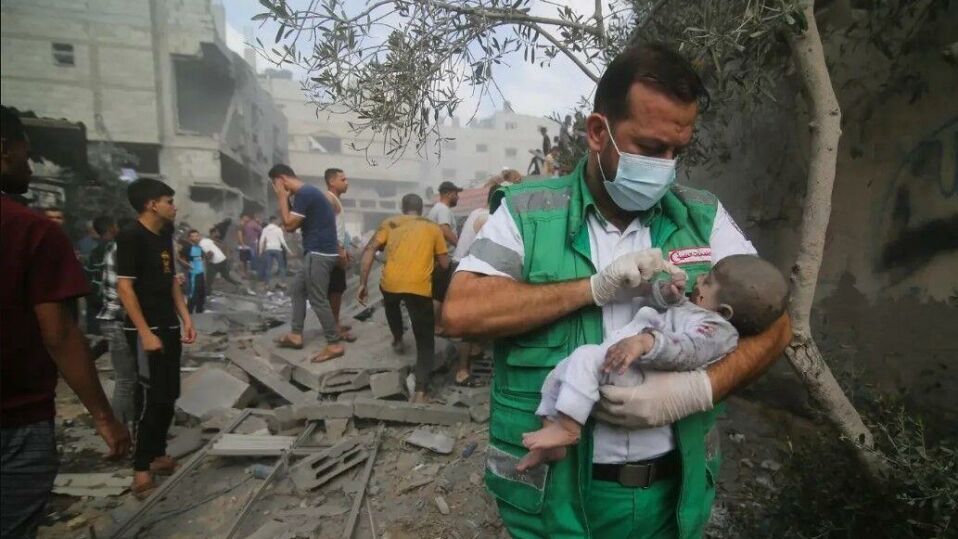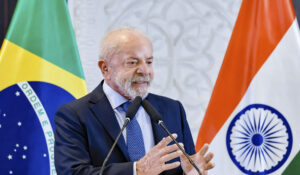
Published 08/14/2024 18:44 | Edited 08/14/2024 19:47
The Italian Foreign Ministry announced today that the country, under its rotating presidency of the G7, intends to present a comprehensive reconstruction project for the Gaza Strip to the United Nations (UN) in September. The proposal aims not only at the humanitarian recovery of the region, but also at its political and economic reconstruction, culminating in the creation of a Palestinian state.
Italy’s Deputy Prime Minister and Foreign Minister Antonio Tajani said the plan, led by the United Nations and Arab countries, seeks to unite Gaza and the West Bank under a future Palestinian state. “In September, I will propose a project for the reconstruction, not only humanitarian but also political and economic, of Gaza. Italy is ready to send a contingent to work, in a transition that will be led by the United Nations and led by Arab countries, towards the birth of a Palestinian state, uniting the Strip and the West Bank,” Tajani said.
However, the viability of this plan faces a series of complex challenges, both diplomatic and internal, as highlighted by the Secretary General of the Latin American and Caribbean Palestinian Confederation (Coplac), Emir Mourad, in an interview with Red Portal.
He expressed skepticism about the implementation of the Italian plan. “I personally don’t believe that this will happen. The Palestinian Authority will have an answer, but the process is much more complex than just a Western country presenting a proposal.”
Mourad notes that the Italian proposal, which seeks to negotiate exclusively with the Palestinian National Authority (PNA), needs to consider the internal dynamics between the various Palestinian groups.
“At the UN, officially, countries always refer to the PLO or the Palestinian National Authority. You don’t negotiate with groups like Hamas or Fatah separately. This is an official issue, and there is no way around it,” Mourad explained. However, he stressed that the situation on the ground is more complex, especially after the recent China-sponsored meeting that was attended by all major Palestinian groups, including Hamas.
“At the meeting between China and all Palestinian groups, including Hamas and Fatah, unity was agreed upon around the PLO, chaired by Mahmoud Abbas. However, the PA will not take a position without respecting internal democratic processes and consulting relevant bodies, such as the Palestinian National Council,” Mourad explained.
International support and training of Palestinian forces
Tajani was emphatic in stressing that the only legitimate interlocutor in this process is the Palestinian National Authority (PNA). He categorically rejected any dialogue or negotiation with Hamas, which currently controls the Gaza Strip. According to Tajani, “How can we recognize a state while Hamas exists, which controls a large part of Palestine and claims that it wants to destroy Israel? Others have recognized it and what has changed?”
Mourad stressed that the proposal to rebuild Gaza will certainly encounter resistance from Israel, which opposes the creation of a Palestinian state under the current conditions. “The main thing now is to reach a definitive ceasefire and ensure the withdrawal of Israeli troops before talking about reconstruction. Furthermore, an international conference on aid to Gaza will have to involve several global players, such as China and Russia, without the influence of those who supported the genocide,” Mourad said, referring to the United States’ continued support for Israel.
The plan has already received support from the United States, which has asked Italy to train its military police force to provide Palestinian security services. Such training is seen as a crucial step towards ensuring stability and security in a future Palestinian state, and enabling local forces to administer the region autonomously.
Italy and the changing positions in the West
Although Italy has yet to officially recognize the Palestinian state, as several other European countries have done, Tajani reaffirmed Rome’s commitment to the “two peoples, two states” solution. According to him, this is the only viable way to achieve lasting peace in the region. However, he argued that such a solution will only be possible if the Palestinian people have a concrete perspective for the future, something he considers unfeasible as long as Hamas remains in power in Gaza.
The Italian foreign minister also said that his government will work diplomatically to persuade Israel to agree to negotiate the implementation of the “two peoples, two states” formula. The Italian proposal, if successful, could represent a significant step towards peace in the Middle East, offering new hope for a resolution to one of the world’s most protracted and complex conflicts.
Italy’s stance in favor of the creation of a Palestinian state marks a significant shift in foreign policy for the country, which until now had not officially recognized Palestine as a state. Mourad noted that this shift can be attributed to the global impact of the conflict in Gaza and the growing pressure for a peaceful solution. “The continued massacre and brutality of the attacks have changed some positions, even among countries that were previously hesitant to recognize Palestine.”
“In the face of the ongoing genocide, some positions are changing,” Mourad said, adding that Israel’s stance at the UN, such as Ambassador Gilad Erdan’s recent speech, is further isolating the country on the international stage. “This will have repercussions among diplomats and between countries. What Israel is doing is a diplomatic aberration,” he said, referring to the supremacist tone of the speech accusing the Palestinian ambassador of being a terrorist.
Prolongation of the conflict
However, Mourad warned that the Italian plan, to be detailed at the G7 meeting, must deal with the reality that any process of rebuilding Gaza will require the consensus of all Palestinian groups and the full withdrawal of Israeli troops, something that Benjamin Netanyahu’s government appears unwilling to accept.
Mourad also highlighted Israel’s resistance to a reconstruction project led by an international coalition. “Netanyahu is doing everything he can to continue the genocide and stay in power. The Palestinian resistance is inflicting defeats day after day. Israeli society and its economy are being undermined by the prolongation of the conflict, which could lead to a change in Israel’s internal political dynamics.”
He recalled the pressing threat of retaliation from Iran, which was deliberately delayed to undermine Israeli morale. He also referred to the 200,000 Israeli settlers expelled from southern Lebanon by Hezbollah, as well as the erratic movements of Israeli forces from north to south of Gaza. “The resistance in Gaza sent a missile to Tel Aviv yesterday. This has never happened before. For someone who says they are winning the war, how can Hamas still send missiles to Tel Aviv?”
The presentation of the project in September to the UN will mark a crucial moment for international diplomacy, especially at a time when the conflict between Israelis and Palestinians continues to generate regional and global tensions. The Italian initiative seeks to involve not only Western powers, but also Arab countries, in a joint effort towards the creation of a Palestinian state.
However, the success of this initiative will depend on several factors, including Israel’s acceptance, the weakening of Hamas’ control in Gaza, and the ability of the international community to mobilize the resources needed to rebuild the region.
Source: vermelho.org.br

